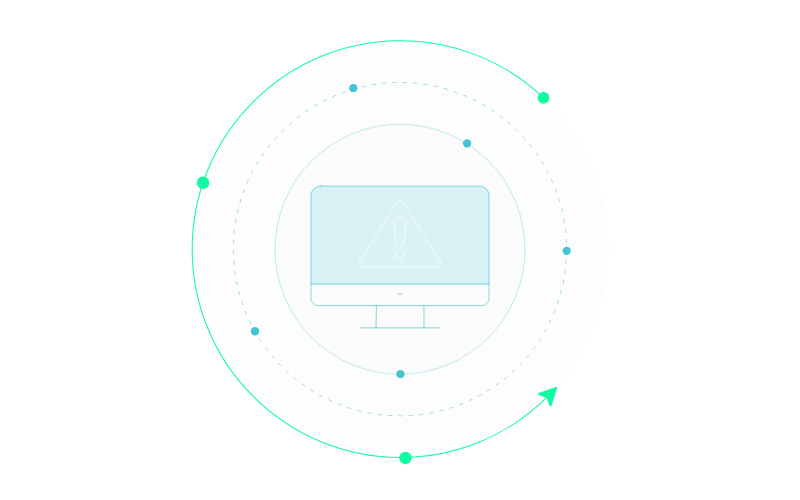The Payment Card Industry Data Security Standard (PCI-DSS) defines a set of security standards designed to protect cardholder data during payment card transactions. NAC is an essential technology when it comes to meeting PCI-DSS security requirements.

Portnox can complement firewall technologies by enforcing access control policies, ensuring that only authorized devices and users can access the cardholder data environment (CDE).
Portnox can enforce endpoint compliance by verifying that devices meet security standards and have proper configurations before granting access to the network.
Portnox can help ensure that only authorized and compliant devices can access the network, reducing the risk of unauthorized access and potential eavesdropping on cardholder data transmissions.
The Portnox Cloud integrates with antivirus systems and enforce compliance by verifying the presence and up-to-date status of antivirus software on devices attempting to access the network.
Portnox can enforce granular access controls based on user roles and device posture, allowing only authorized individuals and devices to access specific segments of the network that contain cardholder data.
Portnox plays a role in user authentication by integrating with identity and access management (IAM) systems, ensuring that only authenticated users and devices are granted access to the CDE.
The Portnox Cloud provide detailed logs and audit trails of user and device activities, helping to monitor and track access to sensitive resources, and generate alerts or reports for suspicious activities.

Every endpoint connected to your network represents a potential entry point for a cybercriminal. With automated endpoint remediation from the Portnox Cloud, you can rest easy knowing all your users’ devices are compliant with your risk policies, and that common device vulnerabilities are eliminated.
PCI-DSS security & compliance
PCI DSS stands for Payment Card Industry Data Security Standard. It is a set of security standards established by major payment card companies, including Visa, MasterCard, American Express, Discover, and JCB, to ensure the protection of cardholder data and maintain the security of credit card transactions.
The PCI DSS applies to any organization that handles, processes, or stores payment card information, including merchants, financial institutions, service providers, and other entities involved in the payment card ecosystem. The standards were created to prevent data breaches and protect sensitive information, such as cardholder names, primary account numbers (PANs), expiration dates, and security codes.
Key objectives of the PCI DSS include:
Compliance with PCI DSS is mandatory for organizations involved in payment card processing. Non-compliance can result in fines, restrictions on card processing, and reputational damage. Organizations typically undergo periodic assessments and audits to ensure their compliance with the standard and maintain the security of payment card data.
PCI DSS helps to secure various types of data that are involved in payment card transactions. The standard primarily focuses on protecting cardholder data, which refers to the information associated with the payment card used in a transaction. This data includes:
It’s important to note that PCI DSS also covers other related data and systems that could impact the security of cardholder data. This includes information security policies, network infrastructure, firewall configurations, access controls, logging and monitoring mechanisms, and other components involved in the processing, transmission, and storage of payment card information.
By implementing the security controls and measures outlined in PCI DSS, organizations can effectively safeguard these types of data, reducing the risk of data breaches and unauthorized access.
Yes, PCI DSS does require network segmentation policies as part of its security requirements. Network segmentation is the practice of dividing a computer network into smaller, isolated segments to enhance security and reduce the scope of a potential security breach. By implementing network segmentation, an organization can separate systems and sensitive data into different network segments, limiting the potential impact of a breach or unauthorized access.
The specific requirements related to network segmentation in PCI DSS are outlined in Requirement 1: Install and maintain a firewall configuration to protect cardholder data. The standard mandates the following:
These requirements emphasize the need for organizations to implement network segmentation and properly configure firewalls to protect cardholder data. Network segmentation helps to restrict access, control traffic flow, and minimize the risk of unauthorized access to sensitive data by isolating systems that handle cardholder data from other parts of the network.
It’s important to note that the specific network segmentation requirements may vary depending on the organization’s environment, but the general principle of implementing network segmentation to protect cardholder data remains consistent across all PCI DSS compliance obligations.
Yes, endpoint compliance is mandated in PCI DSS. The standard includes requirements and recommendations to ensure the security of endpoints, which are devices or systems connected to a network, such as desktop computers, laptops, point-of-sale (POS) terminals, and servers. Protecting endpoints is crucial because they often have access to and process cardholder data.
The following PCI DSS requirements specifically address endpoint security:
Requirement 5: Protect all systems against malware and regularly update anti-virus software or programs:
Requirement 6: Develop and maintain secure systems and applications:
Requirement 8: Identify and authenticate access to system components:
These requirements highlight the importance of implementing security measures on endpoints to protect against malware, regularly updating software and systems to address vulnerabilities, and implementing strong access controls, including the use of multi-factor authentication.
Endpoint compliance plays a crucial role in securing the overall cardholder data environment (CDE) and minimizing the risk of unauthorized access or compromise of sensitive data. Organizations must ensure that their endpoints are properly secured, regularly patched, and protected against malware as part of their PCI DSS compliance efforts.
After completing the form, an email will be sent to you with the report download link.